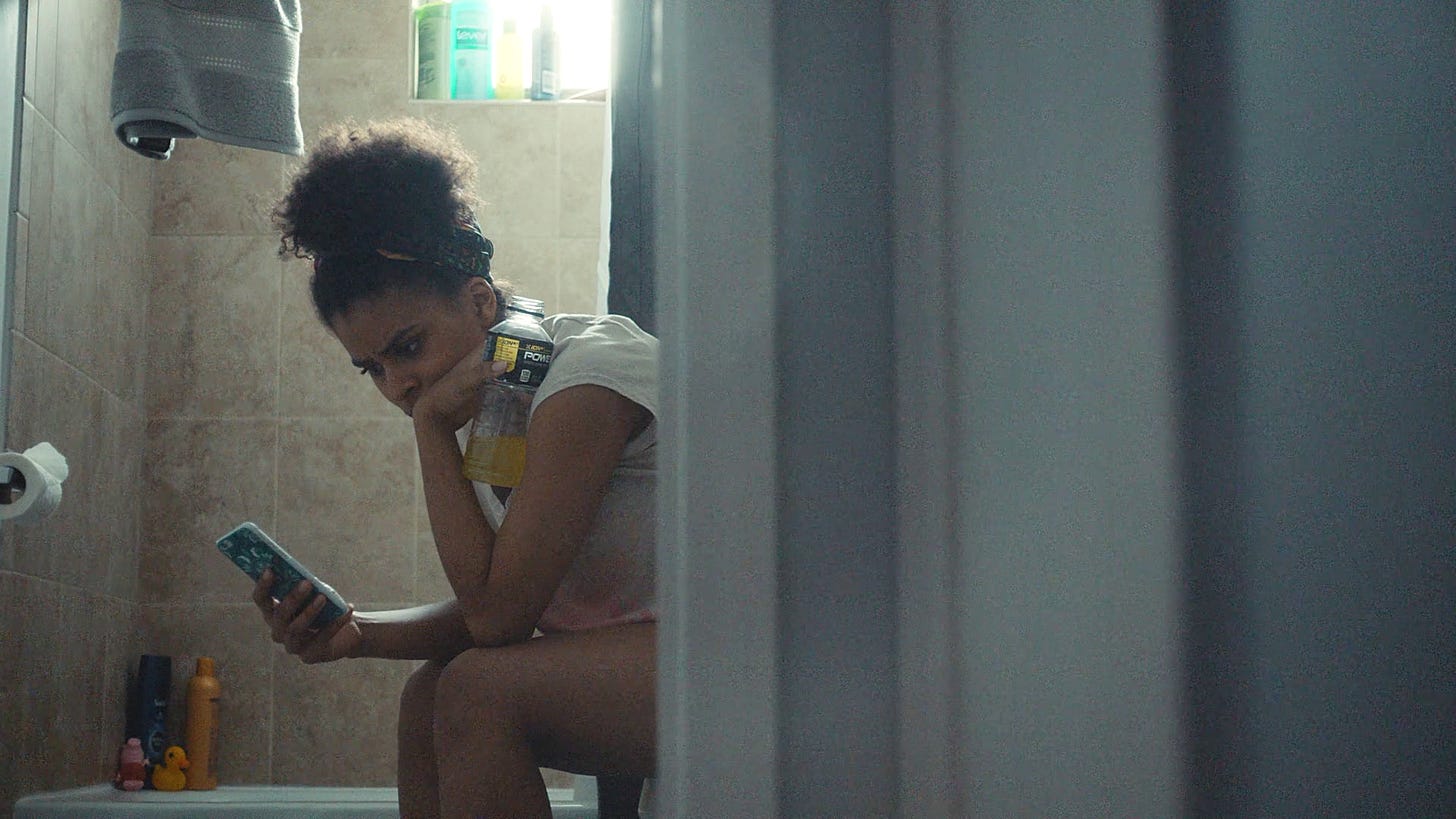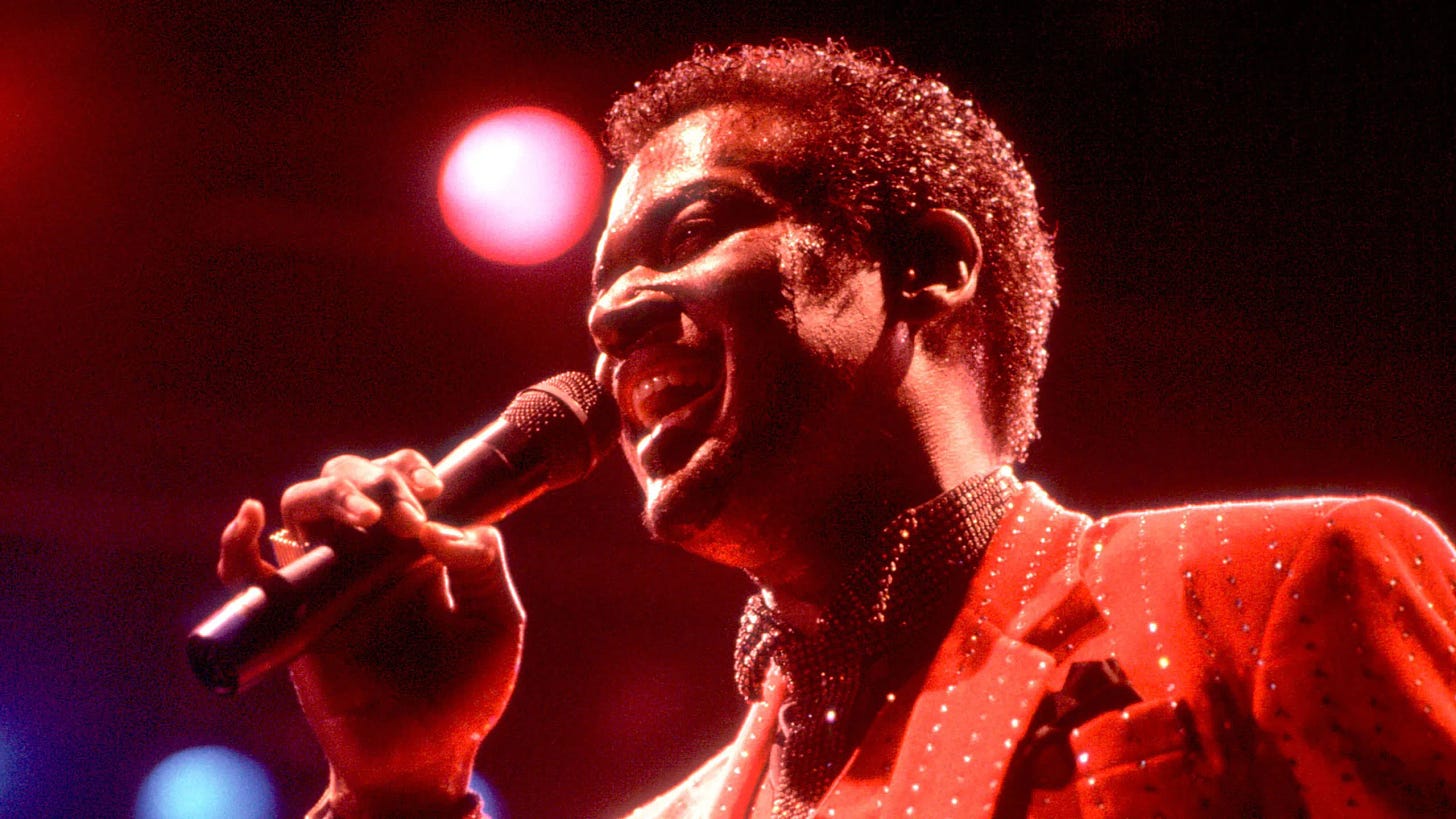By The Numbers
How data took over our lives, twisted our morals, and made our movies suck. Plus: This week's Movie Pick.
“Quantity has a quality all its own.” - Joseph Stalin
Before we dive in here, do me a quick favor: Scroll down and see how many likes this post has racked up so far. I’ll wait.
Back? Great. How's it looking? I’m guessing good enough, since you’re still here. That or you’re reading this out of pity - in which case, thank you, please like and subscribe. Or perhaps you’re already off reading something more liked, and therefore better.
Hey, I get it. No hard feelings. Because thanks to you, I’ve got one more page view on my Substack dashboard, where the numbers keep ticking up... slowly but surely.
1. Numbers Don’t Lie. But This Week, They Did.
“At a certain point, the math, uh… just… the math,” stammered Professor Allan Lichtman on his livestream late Tuesday night. The so-called “Nostradamus of US presidential elections,” famed for using data to predict nine out of 10 elections since 1984, had called it for Kamala Harris. But his calculations had gone horribly wrong.
All the right numbers were there. Final battleground polls had Harris up by nine points. The economy was “on fire,” pundits crowed: Q3 growth clocked in at a robust 2.8%; the Dow surged past 40,000; 254,000 jobs added in September; inflation dipped to nearly 2% - every indicator pointing to an incumbent win. And yet, over 71 million Americans voted for Donald Trump, citing “deep economic discontent” in exit polls. How? What were the numbers not telling us… about us?
2. Our Days Are (Literally) Numbered.
Humans love numbers, and for good reason: They’re fundamental to our civilization. Numbers are seen as neutral, clarifying, rational, and honest. They fuel scientific breakthroughs, track achievements, and drive efficiency.
In the past two decades, a torrent of data - fed by the internet and social media - has blessed us with new numbers by which we track our health, wealth, and popularity, all in real-time and with stunning granularity. Estimates suggest that we now generate more data every day than all of humankind did from the dawn of time to the year 2010.
Our reliance on numbers has deepened to the point where they now dictate our decisions and shape our perceptions of value - from Glassdoor to Rotten Tomatoes. They have become the dominant lens through which we interpret the world. Just ask my young cousins, who reflexively check the views before watching videos I share with them. For someone who grew up in the 90s, this is a jarring shift. Back then, if a band we loved rose too high on the charts, they were dismissed as uncool “sell-outs.” The internet flipped that. In 2024, more numbers = more cool.
It’s in our nature to seek certainty through numbers. People are more inclined to click on headlines with numbers in them, believing that information to be more credible.
Words, on the other hand, are increasingly unpopular - particularly those spoken by our institutions. How unpopular? Here are the numbers: 66 percent of Americans report having little or no trust at all in traditional media. Humanities majors - fields like English and History - have nosedived over 30% in the past ten years, with the majority of students choosing STEM. Words are for losers and poors. Numbers won.
3. Enter The Numerati.
Once, our cultural elite was led by Ivy League Literati and Hollywood Glitterati. Now, it’s Silicon Valley and Wall Street’s Numerati calling the shots - pursuing higher quarterly profits above all else. Rather than resist, we have eagerly followed their lead, demeaning ourselves to chase virality, hockey-stick growth, and infinite scale. It’s made some people a lot of money, and democratized attention in many positive ways. But it’s also become clear that our number obsession has come at a steep cost.
I won’t regurgitate what you already know - the endless studies exposing social media’s addictiveness, its erosion of empathy and critical thinking, or how it makes us feel anxious, narcissistic, depressed, and trapped. We understand that all too well.
Nor will I bemoan how relationships have been flattened into performances and transactions, or that life’s complexities, which numbers cannot capture, have been crudely devalued. I’m guessing you’ve noticed that, too.
What I’d like to explore is how our precious numbers went from being a tool to a tyrant, why this shift has stifled creative innovation instead of fueling it, and how cinema might just be our ticket out of this numbers-obsessed nightmare.
4. Dawn of the Data.
The story of numbers begins as many good stories do - with a baboon.
In 1950, a Belgian archaeologist was excavating Paleolithic ruins in the Congo when he unearthed a 20,000-year-old artifact: a curved baboon bone engraved with 168 precise tally marks. Known as the Ishango Bone, it is humanity’s oldest known counting tool.
17,000-ish years later, the word “data” emerged from Latin, meaning “things given” or “gifts.” Even then, the act of counting and recording numbers was rare. Quantifying life’s divine mysteries was seen as hubris - a forbidden curiosity. Plato believed even numbers were a bad omen. In the Old Testament, when King David orders a census of Israel, God responds with a plague.
Over time, however, record-keeping became essential for rulers and landowners, culminating in the invention of statistics in the late 18th century, and with it, the concept of data also shifted - from “things given” to “things taken.” Numbers were no longer just about counting, but about control. It’s no accident the word statistics is derived from state.
In 1890, another infamous census was conducted - not by King David this time, but by the U.S. Census Bureau. “The frontier is closed,” Frederick Jackson Turner famously lamented upon seeing the results. Little did he know, a new frontier had just opened.
See, the Bureau had enlisted German-American statistician Herman Hollerith and his strange new invention, an electromechanical punchcard system - a system that allowed them to reach a rough census total in only six weeks. The previous census had taken eight years.
This was the dawn of the data-driven world we live in today. Whether it was a blessing, or another Old Testament plague, is the question at hand.
5. Derivatives.
“So, you’re not diverse, are you? Or like, ‘queer’… at all?” the agent asked me.
My throat tightened. I was in a meeting at one of the biggest agencies in Hollywood - an agency I dreamed of joining. “Uh, no. I guess not,” I stammered, heat flushing my “cis white” cheeks. She nodded and marked a box. I never heard from them again.
It was 2018. What I didn’t understand then was that my identity was being crunched - into numbers. No longer would I simply be a writer defined by my work. Instead, I became a data set - race, gender, pronouns, sexual orientation, disabilities - all in the name of diversity and inclusion, an initiative that, while genuinely noble and overdue, felt dehumanizing, reductive, and “data-fied” in its execution. As the industry tilted away from nuance and toward rigid marketing categories and “outcomes,” Pride flags were plastered in every corporate window, and the new identity labels multiplied - numbers dressed as words.
“Our business is driven by investing thematically in sectors with powerful secular tailwinds, and there is no better example of this than content creation in Los Angeles.”
- Ken Caplan, Global Co-Head of Blackstone, after a 49 percent acquisition of three studios.
This financialization of Hollywood kicked off in 1978, when capital gains taxes were slashed in half. Years of deregulation followed, paving the way for venture capital, hedge funds, and private equity to sink their fangs into the industry. By 2021, they had major stakes in all the big studios, and seasoned, creative-minded executives were being swapped for technocrats and finance gurus with scant regard for filmmaking.
As studios ballooned into conglomerates, they embarked on “lowering overhead” and squeezing their acquisitions dry through endless sequels and reboots. Instead of original storytelling, we now get hollow copies of previously successful films, each iteration slightly more lifeless and degraded than the last. But for the Numerati, it’s never about quality. Only the promise of more.
While Hollywood is no stranger to cynical, assembly-line productions, new tech allows for even less risk. Cinelytic, an AI software backed by private equity, claims to predict box office returns “with up to 85% accuracy before a single frame is filmed,” factoring in cast, theme, genre, and release date. The result, whether intended or not, is to block the creation of anything that hasn’t already been made before. Save your creativity for the the accounting books, kids - computer says no.
6. Creativity Needs a Reboot.
“Technology is probably the best thing to ever happen to creatives,” Adobe’s chief marketing officer Ann Lewnes said. “I think there’s a myth that data kills creativity,” added Heidi Arkinstall, CEO at Logitech. It’s true that technology has democratized access to creative expression, enabling people to express themselves in ways once unimaginable. And when I consider the sharing economy, 4K camera phones, and platforms like
, I’m inclined to agree with them. Almost.The problem, as I see it, is that we’ve failed to make space for the intangible qualities of life that foster a culture of creativity. Not long ago, the tech industry celebrated the mantra of “fail fast, fail often.” But our focus on numbers alone has eliminated risk-taking and exploration altogether. When data - in the form of metrics, or profit, or discrete identity categories - becomes the singular guiding light, filmmakers (and creatives of all stripes) must fight to reclaim ambiguity in their lives. Numbers are necessary, but far from sufficient.
As film lovers, I believe we must free ourselves from the tyranny of box office statistics. We must also rebel against purely algorithmic consumption. Movie ranking platforms like Rotten Tomatoes and Letterboxd transform us from curious spectators into “professional opinionators, armed with ‘truth’ in the form of precise metrics with which to compare, dissect, and judge everything,” as Thorbjørnsen and Dahlén observed.
“An era can be considered over when its basic illusions have been exhausted,” Arthur Miller once said. In our current era, the prevailing illusion is that of endless growth through numbers - a force that has become destructive more often than progressive. Now, perhaps due to our fixation on numbers at the expense of deeper understanding, we’re entering a scary new era. The numbers have been shaken loose, and nothing’s adding up like it used to. We’ll get through this somehow, I imagine, provided we don’t forget: Not everything that counts is a number.
“If there was only certainty, and no doubt, there would be no mystery.
And therefore, no need for faith.”
- Ralph Fiennes as Cardinal-Dean Lawrence, Conclave
This Week’s Movie Pick: Luther: Never Too Much (2024)
(Dir. Dawn Porter ‧ Documentary/Music ‧ 1h 41m ) On the afternoon of Election Day, my wife and I fled to the movie theater, where we soothed our nerves with Luther: Never Too Much, Dawn Porter’s joyous and electrifying portrait of R&B legend Luther Vandross. Born in East Harlem and raised on Motown and Philly soul, Vandross started singing with the Listen My Brother ensemble before breaking out with David Bowie on the Young Americans record. He went on to write, produce, and perform with Aretha Franklin, Diana Ross, Beyonce, Dionne Warwick, Mariah Carey, Stevie Wonder, and more. In 2023, Rolling Stone named Luther Vandross one of the greatest singers of all time.
Known to critics as the “Pavarotti of Pop,” and to amorous couples as “Dr. Love,” Luther’s sultry hits became the anthems of bedrooms everywhere. He wrote ballads for Broadway and jingles for Juicy Fruit. Yearning to defy the music industry’s rigid, racially-segregated genres, Vandross covered “Superstar” by The Carpenters and collaborated with Richard Marx. Throughout his life, Vandross battled with his weight and questions about his sexuality, but in Luther: Never Too Much, Porter sidesteps the cheap drama in favor of celebrating an exceptional artist with some of the people who knew him best.
This movie was a HUGE bright spot in a very dark week. If you’re looking for a reminder of the brighter things in life, this one is sensational.
Where To See Luther: Never Too Much
Now playing in select theaters, distributed by CNN Films. Watch the trailer here.
News Reel
- honors one of my favorite years in movies with 1999: The Year Cinema Lived.
The election was grim for many, but it was GREAT for tech billionaires angling to replace us all with AI, as
reports: “I am already hearing rumblings that Lina Khan, who led the FTC in an invigorated push to take big tech monopolies to task, is going to be out… Any meaningful federal AI regulations are almost certainly out the window. Unless these companies personally insult Trump, it’s going to be pedal down, guardrails off for the Valley—and the dawning of a supercharged era of surveillance capitalism, attempts to automate labor with AI, and algorithmic discrimination.”- declares a Crisis of Seriousness: “There’s a hunger for honest human engagement that fakery cannot satiate… Five years from now, the cultural landscape will look much different. I expect a lot will change in just the next 12 months. If they were wise, the tech innovators would join us in building a new age of seriousness. But that hardly matters, because we won’t be waiting for their permission.”
That’s all for this week. Thank you for reading Underexposed.
See you next Friday, Alex









Very intriguing take. Another angle: too much money in politics may favor the party with the most money to spend, but quality matters, and no AI can competently judge quality.
I am with you, if you are keeping count. April 2023: https://tedhope.substack.com/p/tyranny-of-competition-and-measurement